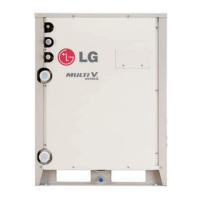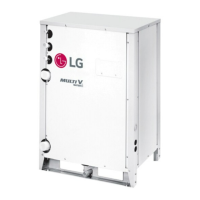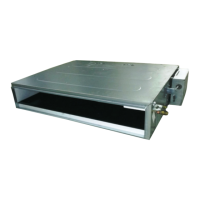112
MULTI V Water IV System Installation Manual
Due to our policy of continuous product innovation, some specifications may change without notification.
©LG Electronics U.S.A., Inc., Englewood Cliffs, NJ. All rights reserved. “LG” is a registered trademark of LG Corp.
MAINTENANCE
General Maintenance Schedule
1. Water Quality Control
• The heat exchanger is not designed to be disassembled or cleaned, and does not contain any replaceable parts. If the heat exchanger
is not usable, the entire exchanger must be replaced.
• To prevent corrosion or scaling, water quality must be controlled. Refer to the recommendations in Table 73 for minimum water quality
requirements.
• Use only anti-corrosion agents or corrosion inhibitor additives that do not contain chemicals which damage or attack 316 stainless steel
and ACR copper.
• Drain and replace the water / glycol mixture on a regular basis as needed. Frequency will depend upon the quality of the water
treatment program used.
Basic Item
Closed Type System Effect
Circulating Water Supplemented Water Corrosion
1
Scale
1
pH (77°F) 7.0 ~ 8.0 7.0 ~ 8.0 ● ●
Conductivity (77°F) mS/m Below 30 Below 30 ● ●
Chlorine ions (mg Cl
-
/ℓ) Below 50 Below 50 ●
Sulfate ions (mg SO
4
2
/ℓ) Below 50 Below 50 ● ●
Acid consumption (pH4.8) (mgCaCO
3
/ℓ) Below 50 Below 50 ●
Total Hardness (mg CaCO
3
/ℓ) Below 70 Below 70 ●
Calcium Hardness (mg CaCO
3
/ℓ) Below 50 Below 50 ●
Ionic-static silica (mg SiO
2
/ℓ) Below 30 Below 30 ●
Reference Item
Closed Type System Effect
Circulating Water Supplemented Water Corrosion
1
Scale
1
Iron (mg Fe/ℓ) Below 1.0 Below 0.3 ● ●
Copper (mg Cu/ℓ) Below 1.0 Below 0.1 ●
Sulfate ion (mg SO42/ℓ) Must not be detected Must not be detected ●
Ammonium ion (mg NH4+)ℓ Below 0.3 Below 0.1 ●
Residual chlorine (mg Cl/ℓ) Below 0.25 Below 0.3 ●
Free carbon dioxide (mg CO2/ℓ) Below 0.4 Below 4.0 ●
Stability index ● ●
1
The “●” mark for corrosion and scale means that there is a possibility of occurrence.
Table 73: Minimum Water Quality Requirements.
2. Flow Rate Control
• The heat exchanger may freeze if water flow rate is insufficient.
• Check for a restricted strainer or if air is in the water piping system. Also measure the temperature and pressure difference between the
inlet and outlet to verify the flow rate is per specifications.
• If the temperature and pressure difference is above the specified range, the flow rate is insufficient. Immediately cease system
operation, locate the source of the problem and repair as needed. After any water circuit maintenance is preformed, always bleed air
from the water system at all installed air vents.
3. Antifreeze Concentration Management
• Use the manufacturer’s recommended type and amount of antifreeze. Do not use solutions with calcium chloride; these can corrode the
heat exchanger.
• Maintain antifreeze levels. If there is a drop in the amount of antifreeze, the heat exchanger may freeze. Ensure that the antifreeze is
not exposed to the atmosphere, and periodically measure antifreeze levels, adding as necessary.

